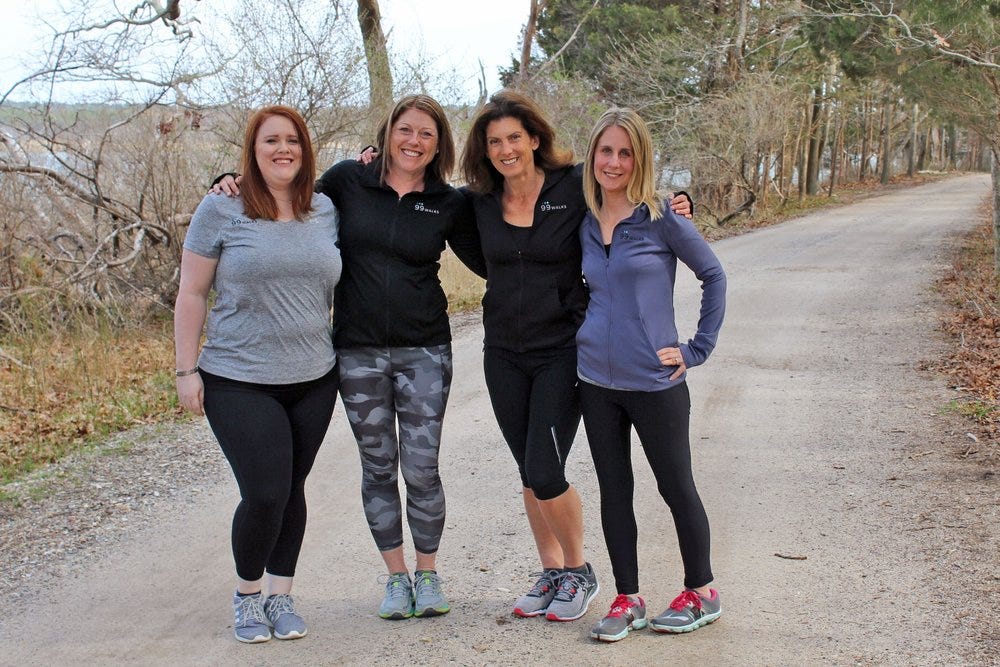
Loneliness is literally impacting our lifespan and reducing our happiness. And I believe that, if we aren’t careful, the next generation is going to inherit the way of life we are creating that is fostering loneliness. And, as I mentioned, I believe that loneliness is driving a lack of understanding, empathy and openness to new ideas: I believe it is part of what is making our society so divisive.
As a part of my interview series about the ‘5 Things We Can Each Do Help Solve The Loneliness Epidemic’ I had the pleasure to interview Joyce Shulman. Joyce is the founder of Macaroni Kid and the Pack Leader at 99 Walks. A recovering attorney, idea junkie, addicted skier, and fitness fanatic, Joyce has spent the past decade working with, leading and inspiring women. A veteran of the TEDx stage, her first book, Walk Your Way to Better, is now available on Amazon.
Thank you so much for doing this with us! Our readers would love to “get to know you” a bit better. Can you share your “backstory” with us? What was it that led you to your eventual career choice?
More than 20 years ago, I abandoned law firm life to free my entrepreneurial spirit and since then I’ve co-founded four companies. My most recent adventure is 99 Walks, a company and a movement on a mission to get a million women walking — together. The idea for 99 Walks arose from the decade I’ve spent working closely with women and seeing firsthand the loneliness and wellness crisis they are facing. And I believe those two things are related.
Can you share the most interesting story that happened to you since you started your career?
Wow, it is hard to find the most interesting … but I remember the very first conference I hosted for the very first community I founded. I walked into a conference room where 45 women were seated, talking, connecting, laughing. And I realized that those women, who hadn’t known each other before, had come together to create something special. It overwhelmed me and I had to walk out of the room for a moment to gather myself!
Can you share a story about the most humorous mistake you made when you were first starting? Can you tell us what lesson or takeaway you learned from that?
Few things make me happier than the chance to talk about women, wellness and walking so I’m a frequent speaker and podcast guest. Recently, I was in the virtual “green room” of a podcast as they were testing the sound levels and they said, “just keep talking.” I was rambling on about my dog and what I had for breakfast and all kinds of nonsense when they suddenly disconnected me. It turns out that they had erroneously had the podcast going as a live feed on the radio!
The lesson really is one that I’ve learned at other times in my life as well … you just never know who is listening so it’s best to try not to sound like an idiot. Ever.
Are you working on any exciting new projects now? How do you think that will help people?
Oh my gosh, so many! I took the TEDx stage in December to share why walking together is magic for women and just published my first book called Walk You Way to Better. Walking is so simple and so incredibly powerful with tremendous benefits for the mind, body and mood. And women walking together is where the real magic happens. All of my current projects are driving to our mission of getting a million women walking.
Can you share with our readers a bit why you are an authority about the topic of the Loneliness Epidemic?
Early this year, we undertook a study of 2,300 women and discovered that 73% of them experience loneliness. 73%! And the anecdotal stories many of those women shared were, frankly, heartbreaking. Lack of trust. Lack of time. Squeezed in the “sandwich generation” caring for children and aging parents. Feeling like they’ve been “burned too many times before.” Moved to a new town for work and can’t seem to “break in.” So many stories.
Since then, I’ve been on a journey not just to understand why, but to offer a deceptively simple fix: encouraging women to get up, get together and get walking. Because the other thing we learned from our research is that women who “regularly walk with friends” report that they are 2.5 times less likely to often feel lonely.
Ok, thank you for that. Let’s now jump to the main focus of our interview. According to this story in Forbes, loneliness is becoming an increasing health threat not just in the US , but across the world. Can you articulate for our readers 3 reasons why being lonely and isolated can harm one’s health?
- As former Surgeon General Vivek Murthy said earlier this year, “loneliness and weak social connections are associated with a reduction in lifespan similar to that caused by smoking 15 cigarettes a day.”
- Lonely people are less likely to get out and be active, which compounds the wellness crisis. I do not believe it is a coincidence that we are seeing obesity levels rise as we see loneliness levels rise.
- People who are lonely have less engagement with others. That means less opportunity to exchange ideas, hear other points of view and learn from one another all of which are critical to learning new things and expanding our minds.
On a broader societal level, in which way is loneliness harming our communities and society?
Loneliness is literally impacting our lifespan and reducing our happiness. And I believe that, if we aren’t careful, the next generation is going to inherit the way of life we are creating that is fostering loneliness.
And, as I mentioned, I believe that loneliness is driving a lack of understanding, empathy and openness to new ideas: I believe it is part of what is making our society so divisive.
The irony of having a loneliness epidemic is glaring. We are living in a time where more people are connected to each other than ever before in history. Our technology has the power to connect billions of people in one network, in a way that was never possible. Yet despite this, so many people are lonely. Why is this? Can you share 3 of the main reasons why we are facing a loneliness epidemic today? Please give a story or an example for each.
Ah, dare I point a finger at social media? I believe that the incredible rise in social media is being driven, at least in part, by the loneliness epidemic. Now, on the one hand, social media can be useful in helping to forge connections. But social media is a poor substitute for meaningful human connection. So I think we are in a place where people feel like they have friends (“I have 500 friends on Facebook, so I have lots of friends”) and yet yearn for the genuine human connections that can truly only be forged face-to-face.
Second, people move around more than they did in prior generations, both professionally and personally. My dad taught school for 36 years with largely the same group of teachers and coaches who were his dearest friends. These days, people change jobs far more frequently, which makes it far more difficult to create those long-term, sustained relationships.
Finally, we are all too busy. It seems obvious, but the best antidote for loneliness is spending time with other people. But all indicators show that we are working harder and feeling more pressure than prior generations. All of that work and all of that pressure leaves little time for time spent forging the human connections that are essential to ending the loneliness epidemic.
Ok. it is not enough to talk about problems without offering possible solutions. In your experience, what are the 5 things each of us can do to help solve the Loneliness Epidemic. Please give a story or an example for each.
- Call a friend and go for a walk together. I know, simple. But walking together gives you time and space, free of distractions and a surge of happiness hormones that helps you connect.
- Put a fence around some weekend time. You can’t just wait to “find time” to connect with your friends and family. You must prioritize that time. Put it on the calendar. Make it happen.
- Spend time with older people. The loneliness epidemic is particularly hard on our elders.
- Make technology your friend. There is no substitute for sharing experiences in person. But technology, if deployed thoughtfully, can help. Facetime, Zoom chats … it is critical to actually see the person you are speaking with but at the very least video chats can help.
- Realize that if you feel lonely, you aren’t alone. With more than 70% of Americans experiencing loneliness, chances are that if you feel lonely, so does the mom down the block, or the guy at the gym. Go first. Make an overture. Say hello. Extend an invitation. Forge a connection.

You are a person of great influence. If you could inspire a movement that would bring the most amount of good to the most amount of people, what would that be? You never know what your idea can trigger. 🙂
Thank you for that. If it’s not become clear already, I am obsessed with our movement to get a million women walking together. Because there is no better way to forge a connection and improve health and wellness: walking together gives you the benefit of a shared experience, the chance to be outside in nature, a trifecta of happiness hormones and the time and space to have a real conversation, free of distraction. It is a simple — and powerful — solution.
We are blessed that some of the biggest names in Business, VC funding, Sports, and Entertainment read this column. Is there a person in the world, or in the US with whom you would love to have a private breakfast or lunch with, and why? He or she might just see this if we tag them 🙂
There are so many people who’s walking habits support their personal wellness and I’d love to Walk + Talk with any of them! Michelle, Oprah, Rachel Hollis … let’s walk and talk!
How can our readers follow you on social media?
They can find me personally on Instagram @joyce.r.shulman and can connect with the 99 Walks community on Instagram @99Walks and on Facebook also at 99 Walks
Thank you so much for these insights. This was so inspiring, and so important!
“5 Things We Can Each Do Help Solve The Loneliness Epidemic” With Author Joyce Shulman was originally published in Authority Magazine on Medium, where people are continuing the conversation by highlighting and responding to this story.



